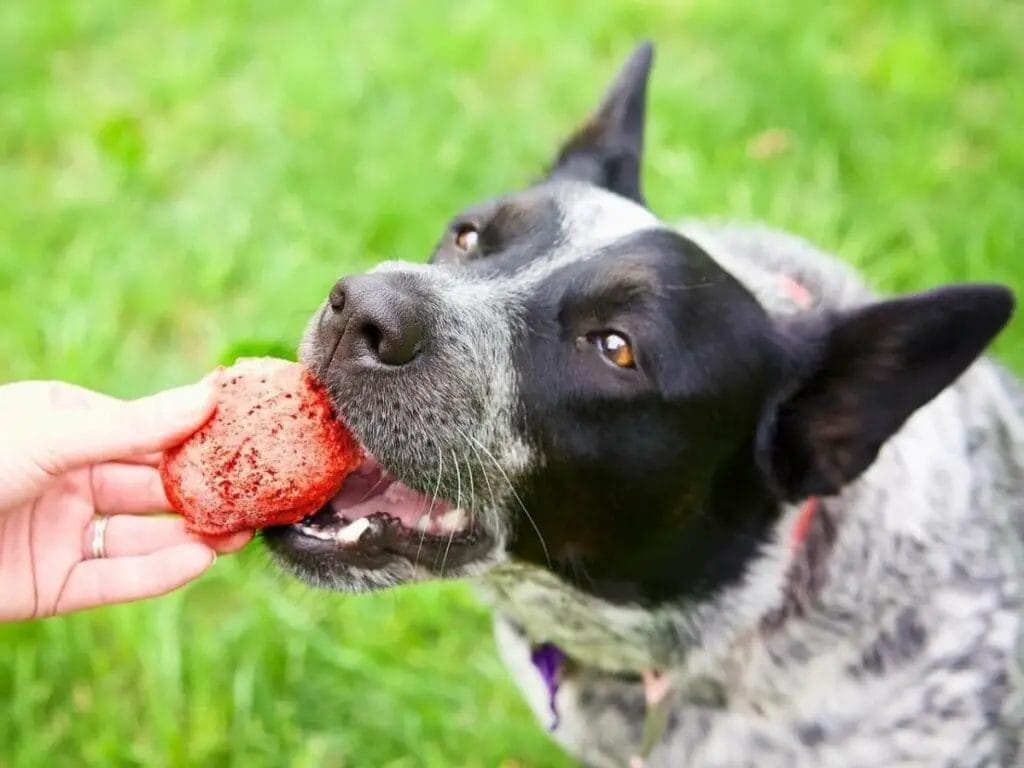
Every time I make meatballs for myself, those puppy eyes peer up at me, begging for a taste. Being deeply involved in the world of dogs, my heart does a little dance when my canine companion wants to share my food.
As a dog owner, it’s natural to want to share the foods we love with our furry friends. Meatballs are a classic comfort food that many of us enjoy, but can dogs eat meatballs?
The answer is yes, dogs can eat meatballs, but only homemade meatballs made with lean meat and dog-friendly ingredients can be a healthy and tasty treat for your pup. It’s important to remember that not all meatballs are created equal. Store-bought or canned meatballs often contain ingredients that can be harmful to dogs, such as salt, fat, or garlic.
Meatballs: A Savory Delight, But Are They Safe?
Sure, we humans love a good meatball – it’s hearty, flavorful, and nostalgic. But the real question is, can our four-legged friends indulge with us? The answer is both yes and no. Let me explain.
While I’ve trained dogs in behavior and obedience, I’ve also made an effort to understand the dietary needs of these amazing creatures. Not all meatballs are the same. The ones you pick up from stores or restaurants? Those can be problematic for our furry buddies. They often contain ingredients like salt, garlic, and fat that aren’t ideal for dogs. But if you’re crafting meatballs in your kitchen and you’re cautious about what goes into them, then yes, your dog can enjoy a meaty treat.
Anatomy of a Meatball: What’s Inside?
For those of you who, like me, enjoy making meatballs from scratch, you know they’re typically made of ground meat, breadcrumbs, eggs, and various seasonings.
Main Components:
- Ground meat (beef, chicken, lamb, pork – whatever you fancy)
- Breadcrumbs (for that perfect consistency)
- Eggs (as a binder and for added moisture)
- Cheese sometimes (because who can resist parmesan or mozzarella?)
Potential No-Nos for Dogs:
- Onions and garlic: These can be toxic to our canine pals, leading to issues like anemia.
- Salt and high-fat content: Dogs aren’t built like us. Too much salt and fat can be detrimental to their health.
Fun Fact: The allium family, which includes onions and garlic, is a common ingredient in many dishes, but they're a big no-no for dogs. Even a tiny bit can lead to health issues.
If you’re whipping up a batch for your pup, keep it simple. Use the meat, breadcrumbs, eggs, and perhaps throw in some dog-friendly veggies like carrots or spinach. No fancy seasonings necessary!
My Meatball Moment
One evening, as I was making dinner, I decided to make an extra batch of meatballs – the dog-safe version. As I mixed the ground turkey, breadcrumbs, and an egg, I thought about how these simple ingredients, devoid of any harmful spices or additives, would be a perfect treat for my dog. No onions, garlic, or exotic spices – just pure, straightforward ingredients. The result? Let’s just say my dog did his happy dance!
Pro Tip: If you're ever in doubt about any food, always check with a veterinarian. Their advice can be invaluable in ensuring our pups stay healthy.

Crafting Dog-Safe Meatballs at Home
There’s something gratifying about making your dog’s food or treats. You’re in control, and you know exactly what’s going into those dishes.
When creating dog-friendly meatballs, consider:
- Using lean meats. Ground turkey or chicken is excellent.
- Incorporating cooked brown rice or even quinoa.
- Tossing in dog-approved veggies like carrots or green beans.
- Adding finely chopped herbs (parsley is a favorite).
- Using a bit of low-sodium broth to add some flavor.
The process is simple: Mix everything, shape into balls, and bake at 350°F for about 20 minutes. The joy on your dog’s face will make every minute spent in the kitchen worth it!
Meatballs and Your Dog’s Nutrition
While I’m no vet, my years in the dog world have given me insights into the nutritional needs of our furry companions. Meatballs can offer protein, essential for muscle development and repair. They can also provide vitamins like B12, D, and E – all crucial for overall dog health.
However, remember, these meaty treats are still treats. Given their calorie content, they should be given in moderation. Always ensure you’re balancing them out with your dog’s regular diet to avoid any unnecessary weight gain.
In essence, while sharing food with our dogs can be a bonding experience, it’s crucial to ensure their safety and health always come first. Make informed decisions and enjoy those special moments with your furry friend!
